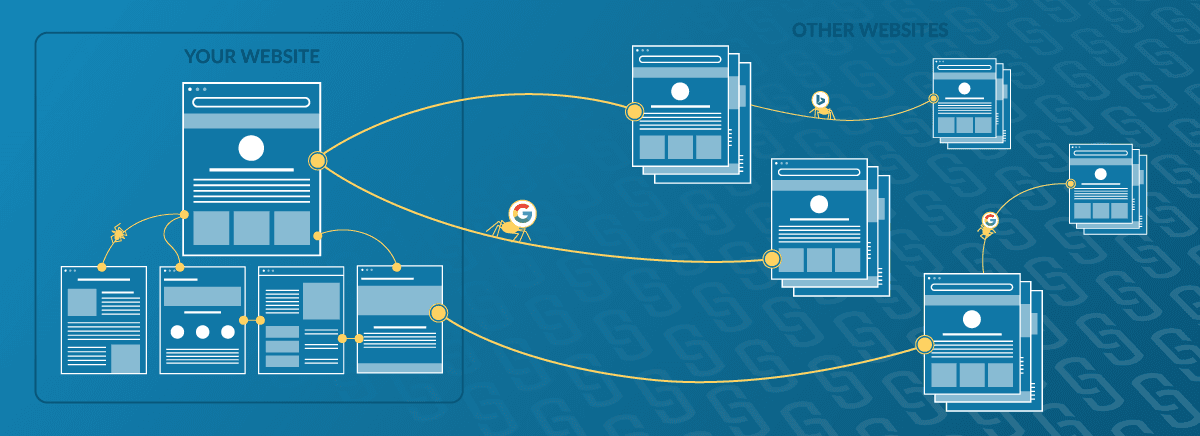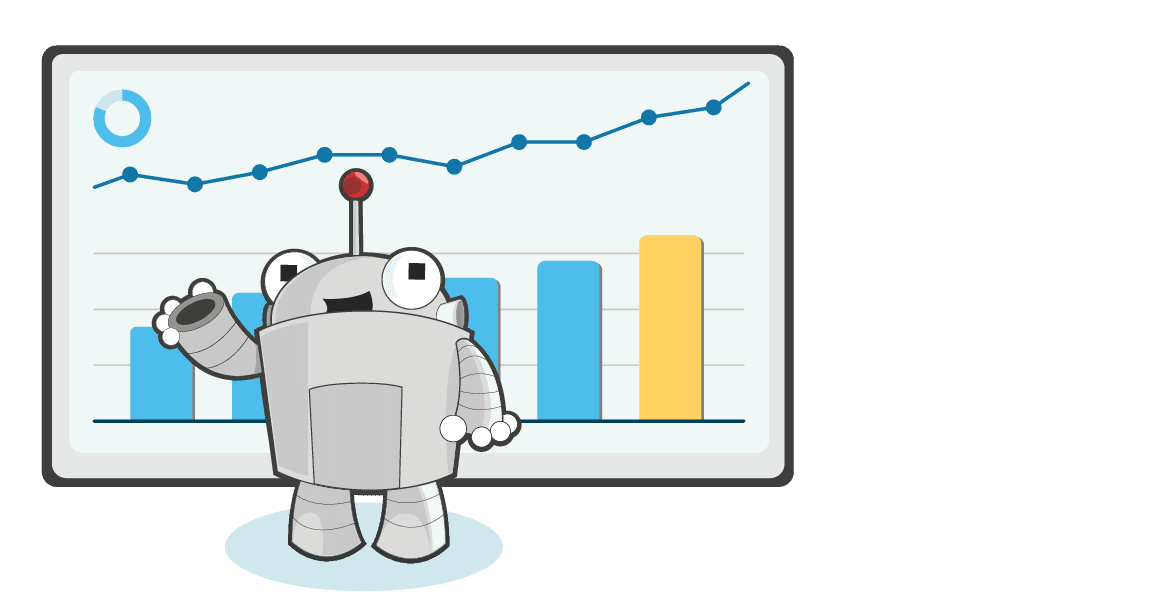The Beginner's Guide to Link Building
What Is Link Building in SEO?
Within SEO, link building plays an important role in driving organic traffic via search engines, especially in competitive industries. When combined with strong technical SEO foundations, great on-page SEO, excellent content, and a good user experience, link building can be super effective at driving more organic traffic.
Today, the need for quality, relevance, and authenticity has never been more important. While low-quality, spammy link building techniques can work, they shouldn’t play a part in a strategy for an organization who is building for long-term organic search success.
Arguably, link building these days is more akin to great marketing, and the organizations who understand this are usually the ones who win long-term. But that doesn’t mean that there isn’t a technical aspect to building links or that all techniques need to revolve around your product. We’ll see that there's still far more to it than this, and far more to understand than ever before.
This guide is designed to get you going quickly, and in the right direction. There's a lot to take in, but we've broken everything up into easy-to-digest chapters and have included lots of examples along the way.
We hope you enjoy the Beginner's Guide to Link Building!
Build better links with Moz Pro
About the Author: Paddy Moogan

Paddy is the co-founder of Aira, a digital marketing agency based in the UK. Aira provides SEO, paid media, content marketing and digital PR services to businesses across the UK, US, and Europe.
The definition of link building
Link building is the process of acquiring hyperlinks from other websites to your own. A hyperlink (usually just called a link) is a way for users to navigate between pages on the Internet. Search engines use links to crawl the web. They will crawl the links between the individual pages on your website, and they will crawl the links between entire websites.

Not all links are deliberately built by SEOs or marketers. Many of them will be created for a range of reasons such as a journalist covering a news story and linking to a source, or a blogger who loves their new coffee machine so much that they link to the retailer who sold it to them.
Acquiring links that you didn’t ask for is the nirvana of SEO. It's always something that you should be striving for and building towards over the long term. You do this by putting in the work to make your website link-worthy, whether that’s through a great product or aspect of your service, or via producing great content that is referenced by other websites.
Alongside this long-term approach, you can also leverage a range of link building techniques which allow you to build your authority and increase your chances of ranking well and getting traffic from organic search.
Aoife O'Connor, Aira
"Most of our link building efforts are content-based. These can vary in format, from large interactive campaigns like indexes, calculators, and tools to static campaigns which could be more report-style with a series of graphics and on-page copy. Quick-turnaround pieces and brainteasers can secure great links back into home or category pages using a pitch email alone."
The anatomy of a hyperlink
In order to understand the importance of link building, it's important to first understand the basics of how a link is created, how the search engines see links, and what they can interpret from them.
Start of link tag: Called an anchor tag (hence the "a"), this opens the link tag and tells browsers and search engines that a link to something else is about to follow.
Link referral location: The "href" stands for "hyperlink referral," and the text inside the quotation marks indicates the URL to which the link is pointing. This doesn't always have to be a web page; it could be the address of an image or a file to download. Occasionally, you'll see something other than a URL, beginning with a # sign. These links take you to a specific section of the URL.
Visible/anchor text of link: This is the little bit of text that users see on the page, and on which they need to click if they want to open the link. The text is usually formatted in some way to make it stand out from the text that surrounds it, often with blue color and/or underlining, signaling to users that it is a clickable link.
Closure of link tag: This signals the end of the link tag to the search engines.
What links mean for search engines
There are two fundamental ways that the search engines use links:
To discover new web pages, which they can then use in their search results
To help determine how well a page should rank in their results
Once search engines have crawled pages on the web, they can extract the content of those pages and add it to their indexes. In this way, they can decide if they feel a page is of sufficient quality to be ranked well for relevant keywords (Google created a short video to explain that process.) When they’re deciding this, the search engines don’t just look at the content of the page — they also look at the number of links pointing to that page from external websites, and the quality of those external websites. Generally speaking, the more high-quality websites that link to you, the more likely you are to rank well in search results.
Links as a ranking factor are what allowed Google to start dominating the search engine market back in the late 1990s. One of Google's founders, Larry Page, invented PageRank, which Google used to measure the quality of a page based in part on the number of links pointing to it. This metric was then used as part of the overall ranking algorithm, and became a strong signal because it was a very good way of determining the quality of a page. It turned out that by incorporating this into their algorithm, Google was able to serve much more useful and relevant search results than their competitors at the time.
It was so effective because it was based upon the idea that a link could be seen as a vote of confidence about a page, i.e. it wouldn't get links if it didn't deserve to. The theory is that when someone links to another website, they are effectively saying it is a good resource. Otherwise, they wouldn't link to it, much in the same way that you wouldn't send a friend to a bad restaurant.
However, SEOs soon discovered how to manipulate PageRank and search results for chosen keywords. At this point in time, Google was far more advanced than most search engines, but was still open to manipulation because it wasn’t very good at telling the difference between a high quality link and a low quality link.
Google started actively trying to find ways to discover websites which were manipulating search results by building low quality links, and began rolling out regular updates which were specifically aimed at filtering out websites that didn't deserve to rank due to poor links.
This has also led to Google starting to discount a number of link building techniques that previously worked well; for example, submitting your website to web directories and getting a link in return. This was a technique that Google actually recommended at one point, but it became abused and overused by SEOs, so Google stopped passing as much value from that sort of link.
Over the years, Google has actively penalized the rankings of websites who have attempted such overuse of these techniques — often referred to as over-optimization — in their link building. This stepped up a gear in 2012 with the first of many updates, which became known as Penguin. These updates targeted specific link building techniques and arguably changed link building forever. From this point forward, low-quality link building techniques could not only be a waste of time, but they could also severely damage a website's ability to rank well in organic search results. This is why we recommend understanding Google Webmaster Guidelines and crafting strategies which won’t fall foul of them.
We don't know the full algorithm that Google uses to determine its search results — that's the company's "secret sauce." Despite that fact, the general consensus among the SEO community and recent studies have shown that links still play a big role in that algorithm.
It’s generally accepted that, if all other factors are equal, the volume and quality of links pointing to a page can make the difference between rankings.
For now, though, there is little doubt that if you get high-quality links to your website, it will help you rank better and get more traffic (we'll talk more about what makes a "good-quality" link in Chapter 1). We've mentioned "high-quality" a few times now, and there's a good reason: The focus on quality is increasing as Google becomes ever more sophisticated at filtering out low-quality links. This directly impacts SEOs, as you need to make sure the link building techniques you choose focus primarily on that quality.

How else can link building benefit my business?
Not only is link building beneficial because it can help contribute towards improved rankings and traffic from organic search, but it also has a range of other advantages which can benefit your business.
It's also true to say that links come naturally as a result of other activities where the central goal may not be to generate links. For example, if you launch a new product which has never, ever been seen before and is truly revolutionary, you’ll probably get lots of links to your website as a result. Or if you create a great piece of content that’s designed to be the best guide in your industry (and it actually is!), then you’re likely to get links as a result.
Neither of these activities, creating a great product and creating a great piece of content, will have been done because of the link building benefit, but links are a consequence of the activity.
This is why we need to think about link building not as a standalone activity, but as something which connects to other parts of your organization and where the benefit goes beyond the links themselves.
Master the Art (and Science) of Link Building
1. Building relationships
Link building can often involve outreach to other relevant websites and blogs in your industry. This outreach frequently relates to the promotion of something that you've just created, such as a piece of content or an infographic. A common goal of outreach is to get a link, but there's much more to it than just this: Outreach can help you build long-term relationships with key influencers in your industry, and these relationships can mean that your business becomes highly regarded and trusted. This in itself is valuable, even if we forget link building for a moment, because you’re creating genuine evangelists and advocates for your business. In some cases, you may build relationships with writers or journalists who end up contacting you and asking for your help rather than the other way around.
2. Sending referral traffic
We've talked about the impact of links on your rankings, but what about the impact of links on referral traffic? A good link from a highly visited website can lead to an increase in traffic, too. If it's a relevant website, chances are that the traffic is also relevant and may lead to an increase in leads or sales, as well.
In this situation, the value of a link isn't just about SEO — it's about customers. If you can place links to your website in front of people who are genuinely interested in what you do, they may well click through. Sure, they may not get their credit card out and buy from you instantly, but they’re now aware of who you are and what you do.
3. Brand building
Good link building can help build your brand and establish you as an authority in your niche. There are some link building techniques, such as content creation, which can show people the expertise of your company, and this can go a long way toward building your brand. For example, if you create a piece of content based on industry data and publish it, you have a chance of becoming well known for it in your industry. When you do outreach and try to get links to the content, you’re showing your expertise and asking other people in your industry to help spread the word and show others the same.
Nick Katseanes, Page One Power
"Links represent a vote of confidence from other authoritative brands and sites to your own.
Like any business, we’ve had ups and downs in organic traffic, and have had to defend our work and budget to stakeholders multiple times. We succeeded by pointing out the long-term trends, not the quick wins.
In the end, the vision we continued to push forward has resulted in average growth in organic traffic of 104% year-over-year spanning the last 5 years. It didn’t happen overnight, but our sustained partnership continues to reach new heights."
An important note on link building vs. link "earning"
Or, the importance of having webpages worth linking to.
Before building links, you need something of value to build links to. Often it’s the homepage of your website. More often than not, though, you build links to specialized resources such as a blog post, tool, research study, or graphic. Sometimes these assets exist long before you begin your link building campaign. Other times, you create these resources specifically with the goal of building links in mind.
This introduces the concepts of link earning and "deserving to rank." As we’ll discuss, all link building campaigns must start with something worth linking to. It’s very difficult to build links to low-value webpages, but when you begin with something truly valuable that people find useful or share-worthy, link building is a much easier endeavor. Not to mention that, long-term, you’re increasing the likelihood that you’ll get links that you didn’t ask for.